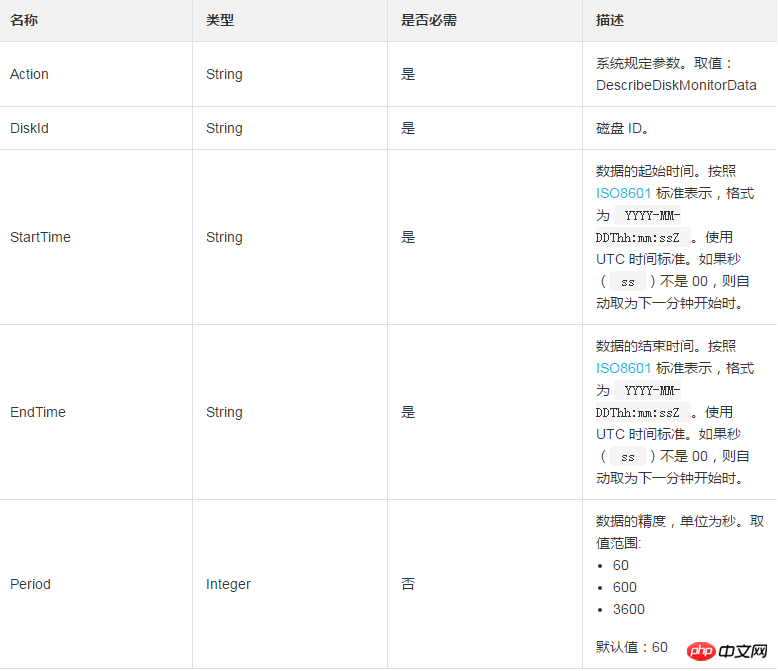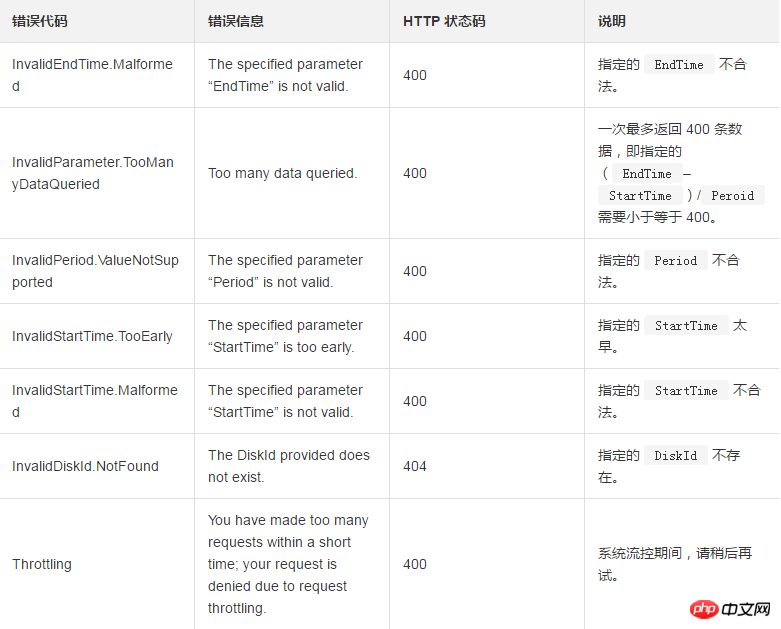
The content of this article is about how to query the usage information of a disk within a specified period. It has certain reference value. Friends in need can refer to it. I hope it will be helpful to you.
DescribeDiskMonitorData
Query the usage information of a disk within a specified period. Practical disk information that can be queried includes read IOPS, write IOPS, read bandwidth (Bps), write bandwidth (Bps), read latency (ms), and write latency (ms). If there is missing content in the queried information, it is because we cannot obtain the usage information during this period, that is, the disk status is not In_Use.
Description
When calling this interface, you need to pay attention:
Only the query status is in use (In_Use) disk usage information. For more details, please refer to the general cloud disk status table.
A maximum of 400 pieces of data can be returned at one time, that is, the specified (EndTime–StartTime)/Peroid needs to be less than or equal to 400.
Request parameters

##Return parameters

Example
Request Example
https://ecs.aliyuncs.com/?Action=DescribeDiskMonitorData &DiskId=d-mydisk001 &StartTime=2014-07-23T12:07:00Z &EndTime=2014-07-23T12:09:00Z &<公共请求参数>
Return example
XML format
<DescribeDiskMonitorDataResponse>
<MonitorData>
<DiskMonitorData>
<BPSRead>0</BPSRead>
<BPSTotal>0</BPSTotal>
<BPSWrite>0</BPSWrite>
<DiskId>d-23b3p4r8b</DiskId>
<IOPSRead>0</IOPSRead>
<IOPSTotal>0</IOPSTotal>
<IOPSWrite>0</IOPSWrite>
<TimeStamp>2014-07-23T12:07:00Z</TimeStamp>
</DiskMonitorData>
<DiskMonitorData>
<BPSRead>0</BPSRead>
<BPSTotal>204</BPSTotal>
<BPSWrite>204</BPSWrite>
<DiskId>d-23b3p4r8b</DiskId>
<IOPSRead>0</IOPSRead>
<IOPSTotal>0</IOPSTotal>
<IOPSWrite>0</IOPSWrite>
<TimeStamp>2014-07-23T12:08:00Z</TimeStamp>
</DiskMonitorData>
<DiskMonitorData>
<BPSRead>0</BPSRead>
<BPSTotal>819</BPSTotal>
<BPSWrite>819</BPSWrite>
<DiskId>d-23b3p4r8b</DiskId>
<IOPSRead>0</IOPSRead>
<IOPSTotal>0</IOPSTotal>
<IOPSWrite>0</IOPSWrite>
<TimeStamp>2014-07-23T12:09:00Z</TimeStamp>
</DiskMonitorData>
</MonitorData>
<RequestId>BF666447-B171-4076-BCBA-48437C18FD76</RequestId>
<TotalCount>3</TotalCount>
</DescribeDiskMonitorDataResponse>JSON format
{
"MonitorData": {
"DiskMonitorData": [
{
"BPSRead": 0,
"BPSTotal": 0,
"BPSWrite": 0,
"DiskId": "d-23b3p4r8b",
"IOPSRead": 0,
"IOPSTotal": 0,
"IOPSWrite": 0,
"TimeStamp": "2014-07-23T12:07:00Z"
},
{
"BPSRead": 0,
"BPSTotal": 204,
"BPSWrite": 204,
"DiskId": "d-23b3p4r8b",
"IOPSRead": 0,
"IOPSTotal": 0,
"IOPSWrite": 0,
"TimeStamp": "2014-07-23T12:08:00Z"
},
{
"BPSRead": 0,
"BPSTotal": 819,
"BPSWrite": 819,
"DiskId": "d-23b3p4r8b",
"IOPSRead": 0,
"IOPSTotal": 0,
"IOPSWrite": 0,
"TimeStamp": "2014-07-23T12:09:00Z"
}
]
},
"RequestId": "A48A0A77-34F5-4C33-9066-9E8D2DA0D8E2",
"TotalCount": 3
}Error code
The following are error codes unique to this interface. For more error codes, please visit the API Error Center.
The above is the detailed content of How to query the usage information of a disk within a specified period of time. For more information, please follow other related articles on the PHP Chinese website!